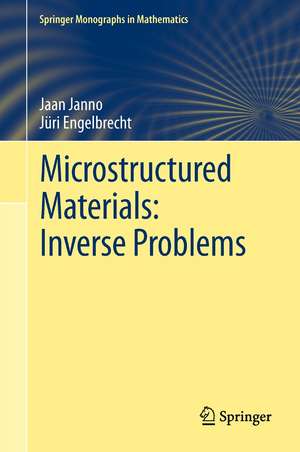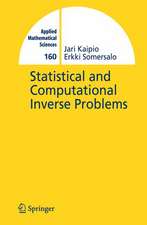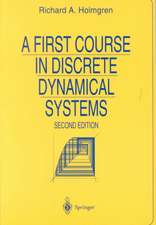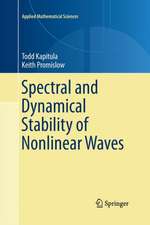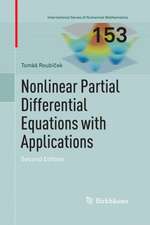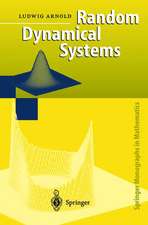Microstructured Materials: Inverse Problems: Springer Monographs in Mathematics
Autor Jaan Janno, Jüri Engelbrechten Limba Engleză Paperback – 27 noi 2013
The authors’ goal has been to construct algorithms that allow us to determine the parameters within which we are required to characterize microstructure. To achieve this, the authors not only use conventional harmonic waves, but also propose a novel methodology based on using solitary waves in NDE. The book analyzes the uniqueness and stability of the solutions, in addition to providing numerical examples.
| Toate formatele și edițiile | Preț | Express |
|---|---|---|
| Paperback (1) | 381.00 lei 6-8 săpt. | |
| Springer Berlin, Heidelberg – 27 noi 2013 | 381.00 lei 6-8 săpt. | |
| Hardback (1) | 383.93 lei 6-8 săpt. | |
| Springer Berlin, Heidelberg – 28 aug 2011 | 383.93 lei 6-8 săpt. |
Din seria Springer Monographs in Mathematics
- 20%
 Preț: 818.27 lei
Preț: 818.27 lei - 15%
 Preț: 607.33 lei
Preț: 607.33 lei - 20%
 Preț: 574.69 lei
Preț: 574.69 lei - 18%
 Preț: 753.21 lei
Preț: 753.21 lei - 24%
 Preț: 740.02 lei
Preț: 740.02 lei - 18%
 Preț: 1234.77 lei
Preț: 1234.77 lei - 18%
 Preț: 969.93 lei
Preț: 969.93 lei - 24%
 Preț: 777.43 lei
Preț: 777.43 lei - 20%
 Preț: 758.01 lei
Preț: 758.01 lei - 24%
 Preț: 1598.57 lei
Preț: 1598.57 lei - 15%
 Preț: 650.86 lei
Preț: 650.86 lei -
 Preț: 396.40 lei
Preț: 396.40 lei - 18%
 Preț: 793.14 lei
Preț: 793.14 lei - 15%
 Preț: 499.77 lei
Preț: 499.77 lei - 18%
 Preț: 1236.19 lei
Preț: 1236.19 lei -
 Preț: 391.61 lei
Preț: 391.61 lei - 18%
 Preț: 1404.30 lei
Preț: 1404.30 lei - 18%
 Preț: 797.24 lei
Preț: 797.24 lei - 18%
 Preț: 916.25 lei
Preț: 916.25 lei -
 Preț: 397.01 lei
Preț: 397.01 lei - 15%
 Preț: 657.25 lei
Preț: 657.25 lei - 15%
 Preț: 467.79 lei
Preț: 467.79 lei - 15%
 Preț: 648.05 lei
Preț: 648.05 lei -
 Preț: 406.25 lei
Preț: 406.25 lei -
 Preț: 389.88 lei
Preț: 389.88 lei - 18%
 Preț: 986.01 lei
Preț: 986.01 lei - 15%
 Preț: 649.54 lei
Preț: 649.54 lei - 15%
 Preț: 581.14 lei
Preț: 581.14 lei - 15%
 Preț: 643.48 lei
Preț: 643.48 lei - 15%
 Preț: 647.73 lei
Preț: 647.73 lei - 18%
 Preț: 902.55 lei
Preț: 902.55 lei - 15%
 Preț: 653.33 lei
Preț: 653.33 lei - 18%
 Preț: 901.88 lei
Preț: 901.88 lei - 18%
 Preț: 907.27 lei
Preț: 907.27 lei - 18%
 Preț: 893.53 lei
Preț: 893.53 lei - 15%
 Preț: 659.53 lei
Preț: 659.53 lei - 18%
 Preț: 802.28 lei
Preț: 802.28 lei - 15%
 Preț: 661.32 lei
Preț: 661.32 lei - 15%
 Preț: 646.62 lei
Preț: 646.62 lei -
 Preț: 384.48 lei
Preț: 384.48 lei - 15%
 Preț: 704.36 lei
Preț: 704.36 lei - 18%
 Preț: 1248.20 lei
Preț: 1248.20 lei - 18%
 Preț: 1031.17 lei
Preț: 1031.17 lei -
 Preț: 409.13 lei
Preț: 409.13 lei - 15%
 Preț: 640.37 lei
Preț: 640.37 lei - 15%
 Preț: 643.34 lei
Preț: 643.34 lei -
 Preț: 388.72 lei
Preț: 388.72 lei - 18%
 Preț: 965.34 lei
Preț: 965.34 lei - 15%
 Preț: 648.89 lei
Preț: 648.89 lei - 15%
 Preț: 651.34 lei
Preț: 651.34 lei
Preț: 381.00 lei
Nou
Puncte Express: 572
Preț estimativ în valută:
72.90€ • 76.12$ • 60.34£
72.90€ • 76.12$ • 60.34£
Carte tipărită la comandă
Livrare economică 04-18 aprilie
Preluare comenzi: 021 569.72.76
Specificații
ISBN-13: 9783642270925
ISBN-10: 3642270921
Pagini: 172
Ilustrații: X, 162 p.
Dimensiuni: 155 x 235 x 9 mm
Greutate: 0.25 kg
Ediția:2011
Editura: Springer Berlin, Heidelberg
Colecția Springer
Seria Springer Monographs in Mathematics
Locul publicării:Berlin, Heidelberg, Germany
ISBN-10: 3642270921
Pagini: 172
Ilustrații: X, 162 p.
Dimensiuni: 155 x 235 x 9 mm
Greutate: 0.25 kg
Ediția:2011
Editura: Springer Berlin, Heidelberg
Colecția Springer
Seria Springer Monographs in Mathematics
Locul publicării:Berlin, Heidelberg, Germany
Public țintă
ResearchCuprins
Introduction.- 1 Inverse problems and non-destructive evaluation.- 2 Mathematical models of microstructured solids.- 3 Linear waves.- 4 Inverse problems for linear waves.- 5 Solitary waves in nonlinear models.- 6 Inverse problems for solitary waves.- 7 Summary.- References.- Index
Recenzii
From the reviews:
“The book is written by well-known specialists in the field of inverse problems and deals with the mathematical analysis of inverse problems arising in the study of complex microstructured materials, ceramics and composites. … The book can be useful for specialists in mechanics and mathematics, and for engineers who use mathematical methods for solving specific practical problems. It will also be useful for graduate students specializing in applied mathematics and mechanics.” (Viatcheslav I. Priĭmenko, Mathematical Reviews, January, 2014)
“The book is concerned with inverse problems of microstructured materials and is composed of 8 chapters. … The book is well written and could find many readers working in the area of microstructured materials.” (Hilmi Demiray, Zentralblatt MATH, Vol. 1235, 2012)
“The book is written by well-known specialists in the field of inverse problems and deals with the mathematical analysis of inverse problems arising in the study of complex microstructured materials, ceramics and composites. … The book can be useful for specialists in mechanics and mathematics, and for engineers who use mathematical methods for solving specific practical problems. It will also be useful for graduate students specializing in applied mathematics and mechanics.” (Viatcheslav I. Priĭmenko, Mathematical Reviews, January, 2014)
“The book is concerned with inverse problems of microstructured materials and is composed of 8 chapters. … The book is well written and could find many readers working in the area of microstructured materials.” (Hilmi Demiray, Zentralblatt MATH, Vol. 1235, 2012)
Textul de pe ultima copertă
Complex, microstructured materials are widely used in industry and technology and include alloys, ceramics and composites. Focusing on non-destructive evaluation (NDE), this book explores in detail the mathematical modeling and inverse problems encountered when using ultrasound to investigate heterogeneous microstructured materials. The outstanding features of the text are firstly, a clear description of both linear and nonlinear mathematical models derived for modelling the propagation of ultrasonic deformation waves, and secondly, the provision of solutions to the corresponding inverse problems that determine the physical parameters of the models. The data are related to nonlinearities at both a macro- and micro- level, as well as to dispersion.
The authors’ goal has been to construct algorithms that allow us to determine the parameters within which we are required to characterize microstructure. To achieve this, the authors not only use conventional harmonic waves, but also propose a novel methodology based on using solitary waves in NDE. The book analyzes the uniqueness and stability of the solutions, in addition to providing numerical examples.
The authors’ goal has been to construct algorithms that allow us to determine the parameters within which we are required to characterize microstructure. To achieve this, the authors not only use conventional harmonic waves, but also propose a novel methodology based on using solitary waves in NDE. The book analyzes the uniqueness and stability of the solutions, in addition to providing numerical examples.
Caracteristici
Mathematical modelling is based on physical principles Physical models are interwoven with inverse problems A novel concept of using solitary waves for NDE is proposed Includes supplementary material: sn.pub/extras
